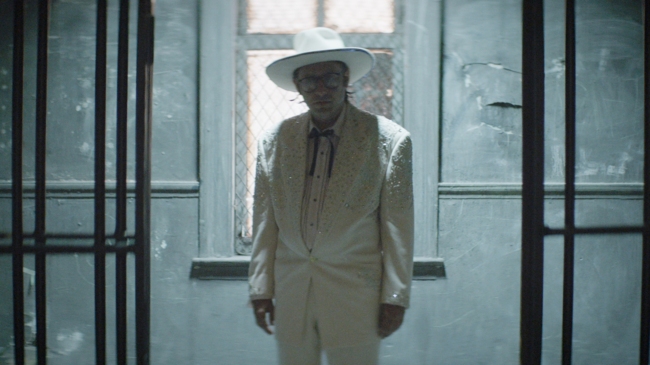
On Friday nights, IndieWire After Dark takes a feature-length beat to honor fringe cinema in the streaming age.
First, the spoiler-free pitch for one editor’s midnight movie pick — something weird and wonderful from any age of film that deserves our memorializing.
Then, the spoiler-filled aftermath as experienced by the unwitting editor attacked by this week’s recommendation.
The Pitch: Why Are We Entertained By This?
Every Neil Hamburger stand-up set is a passionate rejection of the idea that the guy telling jokes on stage should endear himself to the audience in any way.
The fictional comedian, portrayed by Gregg Turkington in comedy clubs and on talk shows for over two decades, has built a cult following for meticulously urinating on the art form to which he’s devoted his life. He takes the stage in a 1960s tuxedo that’s the sartorial equivalent of a half-cantaloupe filled with rancid cottage cheese. His hair is always sculpted into the shape of a skunk that’s been run over by multiple semi-trucks. Clutching three gin and tonics under his arm, he clears copious amounts of phlegm from his throat before spitting out vile, borderline incoherent jokes like, “Why does E.T. the Extra Terrestrial love the taste of Reese’s Pieces? Because that’s what cum tastes like on his planet.”
It’s a brilliant act with one flaw: The audience always laughs. Turkington’s fans relish his depraved subversion of the medium, so his live shows never capture the bleakness that would transpire if Neil Hamburger sincerely performed his “jokes” for an unsuspecting crowd.
Rick Alverson’s “Entertainment” (2015) rectifies that by developing Neil Hamburger into a three-dimensional human being: a small-time comic who has been utterly broken by his pursuit of fame yet remains unwilling (or unable) to change the behaviors that annihilated him. “Entertainment” is as abrasive and unwelcoming as the act that inspired it, never giving audiences a real reason to like The Comedian (as Turkington’s character is credited). Instead, it lets us marinate in his odiousness as his existential crisis turns into a reflection on the roles that art and entertainment play in our lives. The result is a delightful fusion of alternative comedy and arthouse storytelling that hits particularly hard when watched after midnight.
“Entertainment” is to road trip movies what Neil Hamburger is to stand-up: the key components are all there, but they’ve been ripped apart and lifelessly rearranged. The opening shot shows The Comedian stepping onto a jet — presumably to fly to a gig — only to reveal that it’s an abandoned piece of junk in the Mojave Desert that’s been turned into a rinky-dink tourist attraction. Like everything else he encounters, it’s a reminder that his life has amounted to a worthless replica of the dream he set out to chase.
As The Comedian meanders through the desert to play a string of gigs at dive bars and prisons, his monotonous existence — and tragic personal life — lulls us into the kind of trance that a comic would eventually face after months on the road. At a certain point, it becomes hard to distinguish whether the film has gotten stranger or if watching it has simply broken our brains.
The genius of “Entertainment” lies in Turkington’s unparalleled ability to play passive-aggressive losers who see the world’s refusal to conform to their pop culture tastes as a catch-all excuse for why their lives suck. Squint hard enough, and you’ll see traces of his “On Cinema at the Cinema” character when he seethes about comedy clubs providing inadequate anti-heckling security. If the fictional Turkington from that show was able to review “Entertainment” (assuming Tim Heidecker actually let him talk about movies for once), I’m confident he’d give it five bags of popcorn and throw in some stationary to write a suicide note. —CZ

“Entertainment”©Magnolia Pictures/Courtesy Everett Collection
The Aftermath: Someone Suffered to Make It
With actors joining screenwriters on strike today, it’s fun to consider what Neil Hamburger might do in Hollywood’s current situation. The anti-comic’s nauseating ability to verbally invade personal space would undoubtedly help him on picket lines, and I’d personally like to see Neil’s signage outside studio execs’ offices. (“What’s the difference between the AMPTP and the American flag?”)
And yet, it’s practically impossible to imagine the pasty-skinned personality bothering himself with an appearance on Los Angeles sidewalks. The last shot of “Entertainment” — our beleaguered humorist alone in a hotel room, shuddering with as many sobs as laughs, cloaked in the glow of a television displaying himself — seems a more likely scene. In the end, The Comedian is stuck. If producers successfully force actors out of their homes (as one report claimed they were inclined to do earlier this week), the hotel room would be particularly bleak but fitting.
This is to say nothing of the real Turkington’s stance on the existential threats facing SAG-AFTRA, of course. But Alverson’s melancholic portrait of Hamburger’s alter-ego and his small, roadside sliver of the Hollywood machine feels especially timely as artists band together to confront the industry allowing them their stage. Like so many before it, “Entertainment” is a film that tells the tale of Hollywood’s infamously bad marriage to itself: a cyclical codependency between artists and their employers, audiences and execs alike, all too insistent on punishing passion with pain. Only The Comedian won’t go quietly, like him or not.
Hamburger is new to me as a character (I’d heard of him maybe once before screening “Entertainment”), but I’m familiar with his sort-of-an-act. Tim Robinson comes to mind as a contemporary golden boy in a long line of comedians specializing in psychological self-immolation, though in the case of the late Chris Farley self-flagellation was more like it. Neil is more theatrically off-putting than most; shout out to that Madonna dog food breastfeeding bit. But more than that, “Entertainment” jolted my senses with its juxtaposition of personal sacrifice — why doesn’t his daughter pick up? — and the merciless silence of unappreciated attempts at absurdism.
When John C. Reilly (the leeeegendary John C. Reilly) prompts The Comedian to do one of his jokes over dinner in the desert, the nonplussed jokester flatly refuses. “I don’t want to do it here,” he says. “Entertainment” is something of a puzzle of motivation in this way. The Comedian isn’t hungry for every spotlight, and his time at the actual mic sours more with each stop. I’d be interested in seeing a Neil Hamburger live show in the future, if only to help myself think The Comedian’s anguish ended.
I’m as disturbed as anyone by a Crosby, Stills, Nash & Young gang-bang joke, but it was Alverson’s tragically detached perspective on this slow death of a dream I found murderous. The sad clown character offered a recognizable motif in the seriocomic fishbowl filling with bleach that is this character study (remember when the lil guy pooped in the hat? What a nice break!), but it almost made me feel laughed at to return to The Comedian, sweaty and suffering.
All performers but comics in particular sacrifice something, and nowhere is this more crystallized than in the midnight movie sphere. Turkington has done something extraordinary with his career and with Hamburger, crafting a singularly human perspective in all its grotesqueness. There’s a flawed brilliance in “Entertainment” I’m confident one could never achieve without bonkers masochists like Neil — let alone teach to A.I. On the birthing scene, I have nothing to offer. I did laugh. —AF
Those brave enough to join in on the fun can rent “Entertainment” on Prime Video and Apple TV.


